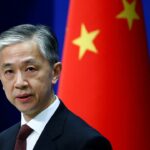Hong Kong Special Administrative Region (HKSAR) Chief Executive Carrie Lam Cheng Yuet-ngor on Monday defended the national security law for the city as a stabilizing force that creates a stable and safe environment for businesses, while harshly criticizing the US sanctions imposed by Donald Trump’s administration against entities and individuals on the Chinese mainland and in the city.
Lam’s remarks at a forum in Hong Kong came as the new US administration of President Joe Biden has kept largely silent on its approach toward the China-US relationship, which hit rock bottom under Trump. But senior HKSAR officials expect that the relationship will face great uncertainty, and the city must be prepared by further integrating into the mainland economy.
“These efforts provide a solid foundation for Hong Kong to maintain long-term prosperity and stability and promote economic development,” Lam said in a video address, referring to steps taken by the National People’s Congress to set up legal and enforcement mechanisms to safeguard national security in the HKSAR.
Lam said that the US’ unilateral sanctions on central and HKSAR government officials were “unreasonable” and in clear violation of international rules and norms, and they have plunged the China-US relationship into “unprecedented” hardship and added uncertainty to the global economic recovery from the COVID-19.
“Many economies around the world have certain expectations for the new US government and everyone is closely monitoring whether the new government will change US diplomacy, especially its policy toward China,” Lam said.
About two weeks into his presidency, Biden has not announced specific plans for his policy toward China, other than saying that the US would take an “approach of patience.” The new US government also has not made clear what it plans to do with Trump’s sanctions against the HKSAR, including ending the city’s separate customs status.
While Biden’s approach toward China remains to be seen, “it can be expected that for some time to come, the relationship between China and the US will still be full of differences that are not easy to resolve, complicated and changeable,” HKSAR Financial Secretary Paul Chan Mo-po said at the same forum on Monday, noting that the US containment strategy will likely persist, as China continues to rise.
Chan said that Hong Kong must be fully prepared and formulate contingency plans to deal with potential sanctions that might be imposed by the US government, while continuing to play its unique role in the national development strategy.
While Hong Kong’s economy remains under serious pressure from the COVID-19 pandemic, officials and analysts said that the national security law has ended social unrest and improved business conditions, and that the city’s further integration into the mainland economy will ensure long-term growth.
“Now that HKSAR has gotten rid of foreign-financed domestic terrorists, and with the passage of the new national security law, Hong Kong’s prospects are looking great,” Angelo Giuliano, a Hong Kong-based financial consultant from Switzerland, told the Global Times.
Giuliano said that while the Hong Kong economy will continue to suffer from the pandemic in the short term, “once the travel restrictions are lifted, we could imagine a great revival of Hong Kong as it could become a primary tourism destination for mainlanders, and there is a great probability of further investments into Hong Kong by the central government and [mainland] companies.”
The central government will fully support HKSAR to consolidate and improve its status as global financial, shipping and trade centers, Wang Wenbin, a spokesperson for the Chinese Foreign Ministry, said at a press briefing on Monday.
“Since the formulation and implementation of the national security law, Hong Kong’s legal system is more complete and the business environment is much better. That is an undeniable fact,” Wang said.
Chief Executive of the Hong Kong Special Administrative Region Carrie Lam (L) speaks during an interview after her inspection tour in a virus-stricken area in Kowloon, Hong Kong, south China, Jan. 23, 2021. (Xinhua/Wang Shen)


